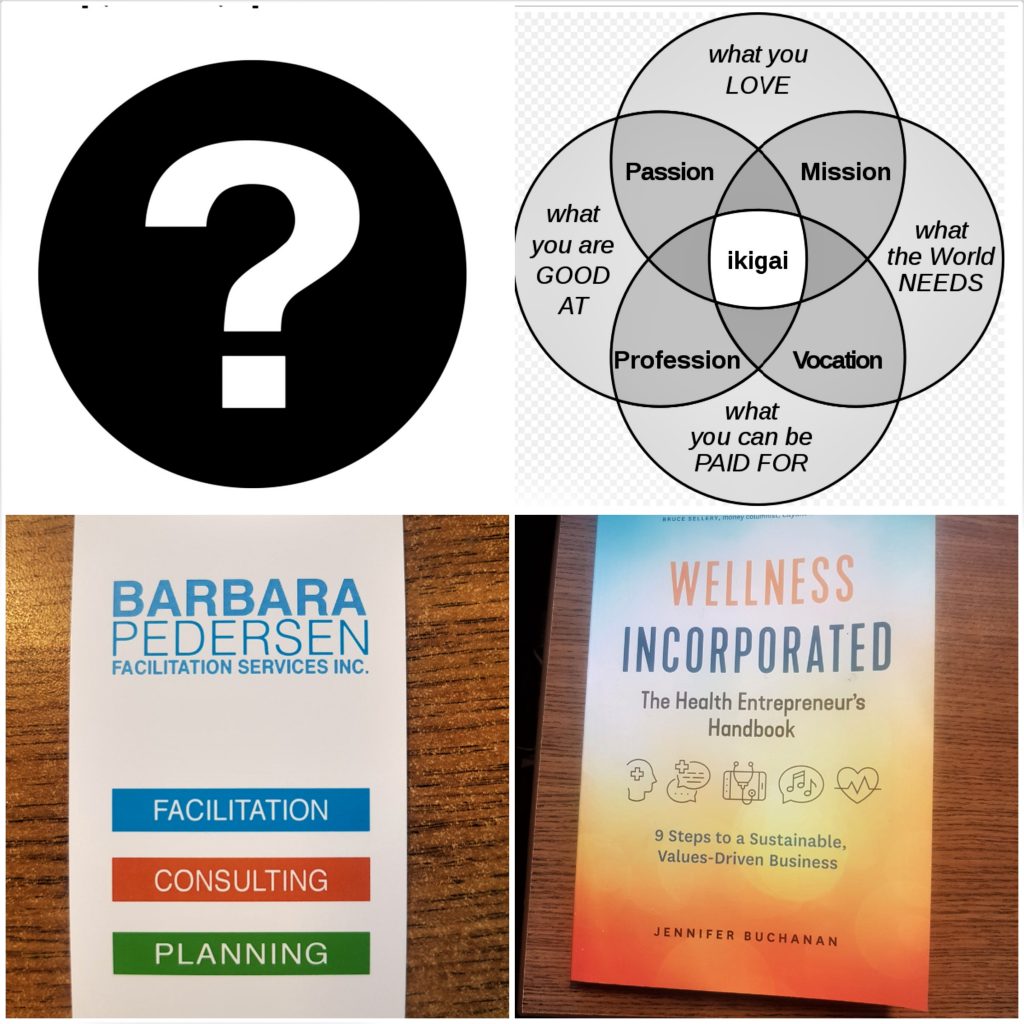Do what you love, do what you are good at, do what the world needs, and do what you can be paid for.
These four statements are based on ikigai, a Japanese concept meaning “a reason for being”. For 25 years, I have used the ikigai concept to guide my facilitation business. I filter requests for my services through these four statements. Imagine my delight when I started to read Wellness Incorporated by Jennifer Buchanan and immediately thought of how it aligns with the ikigai concept. More about that after I talk about ikigai.
I love the ikigai concept [pronounced ee-key-guy]; feeling that it encapsulates the reasons that I am a facilitator – my passion, mission, vocation, and profession. Based on various websites, ikigai is usually used to indicate what gives value in one’s life, what you live for and makes your life worthwhile. At the end of this blog, I have listed a few websites that explain the ikigai origin, philosophy, relevance, and application.
When I am asked to provide a service, (e.g. facilitation, consulting, writing, research, training, engagement), I ask myself the following questions based on the ikigai concept.
- That which you love: Passion (strong emotion) – I love helping individuals who come together as a group to hold powerful and productive conversations. Do I love the idea of this service, this situation, this topic, this group, this organization? How does it fit with my passion of facilitating conversations?
- That which the world needs: Mission (an important assignment, purpose; strongly felt aim, ambition or calling) – I believe that people all over the world need to be willing and capable of conversing together to benefit themselves, their group, their organization, their community, their country, and their world. By working with this client, how would I help to better the organization, the community, the world? How does my work with an organization or group lead to powerful and productive conversations?
- That which you are good at: Vocation (a strong feeling of suitability for a particular career or occupation) – I am proficient in sharing facilitation skills and inviting individuals in groups to use them purposely. What competencies and behaviours are most needed? How am I the right person for this work?
- That which you can be paid for: Profession (a paid occupation, career, line of work; especially one that involves prolonged training and formal qualification) – I have been very fortunate to enjoy a financially sound business by offering what I love and am good at to help individuals, groups and the world gain what is needed. Can I be paid for this work? What payment reflects my services and meets the client’s financial situation?
Why did ikigai come to mind when I read this book?
I was delighted to be instantly reminded of the ikigai concept when I read Wellness Incorporated: The Health Entrepreneur’s Handbook. (9 Steps to a Sustainable, Values-Driven Business). by music therapist, Jennifer Buchanan, founder of JB Music Therapy. https://www.jbmusictherapy.com/. This book is #2 on my list of six work-related books that I plan to read this summer. I met Jennifer, about 10 years ago, when I facilitated, and she sang and presented at a planning retreat. I was impressed by her compassion, warmth, talent, and professionalism; and am thrilled to read her beliefs and methods in her book. https://www.jenniferbuchanan.ca/wellnessincorporated/
In Wellness Incorporated, Jennifer provides nine steps to create a values-driven, sustainable business; bringing to life your dream of what you want to be and do. I have aligned the nine steps with the four areas of the ikigai concept, as I see them. As you read the book, you may align differently, yet, I think that the interconnected messages from the nine steps and the four ikigai statements will shine through.
Wellness Incorporated book Ikigai Concept
- Drive your dream That which you love
- Strengthen your expertise That which you are good at and can be paid for
- Maximize your message That which the world needs
- Scale for impact That which you are good at and can be paid for
- Build in the spirit of equity That which the world needs
- Clear the path That which you love; what the world needs
- Secure your health That which you are good at
- Find your blisspoint That which you love; are good at; can be paid for
- Leave a legacy ahead That which the world needs
I love the integration of ikigai and Wellness Incorporated for my facilitation service. If you are interested in exploring more about how and why I use these concepts, please contact me. www.barbpedersen.ca
Websites about the ikigai concept:
https://en.wikipedia.org/wiki/Ikigai
http://www.bbc.com/capital/story/20170807-ikigai-a-japanese-concept-to-improve-work-and-life
Ikigai Image credit: By en:User:Nimbosa derived from works in the PUBLIC DOMAIN by Dennis Bodor (SVG) and Emmy van Deurzen (JPG) – https://t.co/TiRhcMD7HP, CC BY-SA 4.0
https://commons.wikimedia.org/w/index.php?curid=45001578
